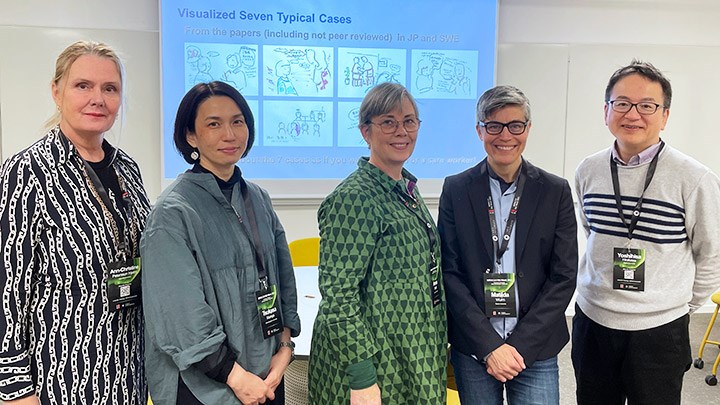Elderly care needs increased knowledge about LGBTQ+

The research group’s scientific poster about treating older LGBTQ+ individuals within elderly care was selected as the best poster at the Research and Innovation Week in Umeå. From the left: Ann-Christine Petersson Hjelm, Uppsala University, Tsukasa Muraya, Chikushi Jogakuen University, Anna Bratt, Linnaeus University, Matilda Wurm, Örebro University, and Yoshihisa Hirakawa, Nagoya University.
Older LGBTQ+ individuals worry about how they will be treated within healthcare and elderly care. They also feel that the staff’s knowledge about LGBTQ+ individuals is inadequate. This is shown in a literature review conducted by researchers from Örebro collaborating with colleagues from Japan.
“At the end of the day, it’s about including older LGBTQ+ individuals and enabling equal care and healthcare,” says Matilda Wurm, researcher in psychology at Örebro University.
Together with researchers from Uppsala University, Linnaeus University, and Japan, two pilot studies have examined the knowledge and attitudes of elderly care staff relating to LGBTQ+ issues. The goal is to find ways to discuss these issues and to increase staff’s understanding of LGBTQ+ individuals.
“A common response we received from healthcare staff in both countries was that they had never met an older LGBTQ+ person. They also stated that they treat all people equally.”
At the same time, previous research shows the opposite.
“Older LGBTQ+ individuals believe there’s a need for increasing awareness and knowledge among staff, which could counteract their negative experiences in contact with healthcare,” says Matilda Wurm.
Illustrations as a communication tool
As a communication tool, researchers interviewed healthcare staff using illustrations. These showed various scenarios that could occur in interaction with elderly LGBTQ+ individuals. Scenarios include meeting at the reception desk, discussing relatives, communicating with colleagues, etc.
“As a tool, they can be used when training healthcare staff. It’s a way of starting a dialogue relating to LGBTQ+ issues, such as in personal contact and communication,” says Matilda Wurm.
Best poster prize winner at Research and Innovation Week in Umeå
Earlier this month, the research group participated in the MIRAI 2.0 Research and Innovation Week in Umeå – an in-person collaboration event between 20 partner universities from Sweden and Japan. The group’s scientific poster on treating older LGBTQ+ individuals within elderly care was selected as the conference’s best poster.
“It’s heart-warming that we won the award at R&I Week since our collaboration started after attending an MIRAI conference,” says Matilda Wurm.
Text: Jasenka Dobric
Translation: Jerry Gray
About MIRAI 2.0
MIRAI 2.0 is a collaboration between 20 partner universities in Sweden and Japan to promote long-term research collaborations. The project focuses on ageing, material science, sustainability, AI, innovation, and entrepreneurship. The University of Gothenburg coordinates the participation of Swedish universities.
The collaboration between Örebro University, Uppsala University, Linnaeus University, Chikushi Jogakuen University and Nagoya University in Japan has been granted seed funding via MIRAI 2.0 over the past two years to support the collaborative initiative between the countries.
More information on MIRAI 2.0
